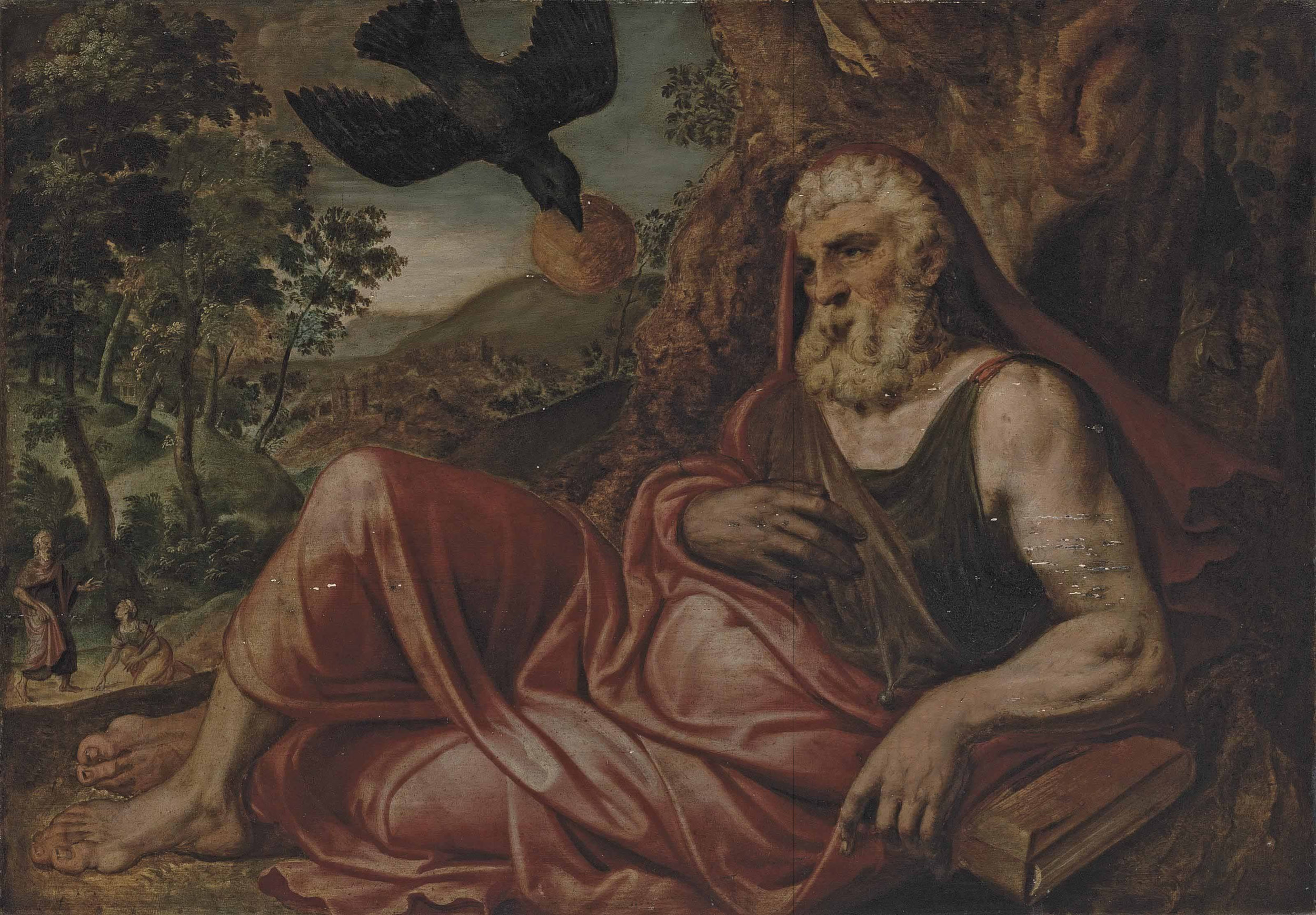The Brook Cherith - Northern Elijah & Elisha: A Mirror-Reading
/image: Wikimedia commons (link).
This is a mirror-reading of the The Brook Cherith Narrative. If you don’t know what mirror-reading is, please visit this page. The Brook Cherith Narrative is primarily concerned with Elijah’s reputation, his place of residence, what happened at the Brook Cherith, which Elohim he served, and if Yahweh was the Elohim of Israel.
If you’d like a less technical overview, please check out my podcast episode on this narrative. If you’re not familiar with Northern Elijah & Elisha, be sure to check out all of the podcast episodes in that series. I used Tzemah Yoreh's work as the basis for my Northern Elijah/Elisha Source. My mirror-reading map and commentary are listed below. In my commentary, I refer to the author of the Northern Elijah/Elisha source as “M”, after Tzemah’s labeling of the source as “Miracle Workers”.
Mirror-Reading Map
The map below shows how I derived the opposing narrative from the Biblical narrative. It relies primarily on mirrors/echos and cause/effect. For more information about mirrors/echoes, causal chains and my methodology, please visit this post.
Commentary
Please note that “M” refers to the author of the opposing narrative
Elijah’s Residence
Since the opposing narrative has Elijah as a fugitive that Ahab was trying to track down (see Ahab and Obadiah for more details), M has to deal with Elijah being an Israelite who wasn’t in Israel. This is done is a few ways. FIrst, Elijah is listed as a Tishbite.
In eight passages, including 21:17, he is identified as “the Tishbite,” but since it is very doubtful that there was a place Tishbe in Gilead, as many commentators have claimed, it is perhaps best to follow the suggestion (see S. Cohen in IDB IV, 653–54) that the “i” should be revocalized as an “o”, giving us the meaning “settler.”
DeVries, S. J. (2003). 1 Kings (2nd ed, Vol. 12, p. 216). Dallas: Word, Inc.
I disagree with “settler’ and side with the KJV in the 9 instances it lists the word as a “sojourner”. This fits the strategy that M would have used to make an excuse for why Elijah, an Israelite, wasn’t in Israel: He was traveling.
“Of the inhabitants of Gilead” is an interesting phrase. Often times, a character introduction will include a phrase such as “of the tribe of”, but once again M is responding to the opposing narrative’s placing of Elijah outside of Israel. By using “inhabitants”, M attempts to establish Elijah’s residence within the territory of Israel.
By having Elijah speak with Ahab out of his own initiative, M attempts to counter to opposing narrative’s idea that Ahab was pursuing Elijah as a fugitive,
The main location for this narrative is the Brook Cherith. The word “Cherith” simply means “seperation” or “cutting” presumably as in how water cuts through the land. If it was small and unknown enough, M can simply relocate the brook to be within the boundaries of israel by adding “of Jordan”. Since the rest of the Elijah narrative takes place near the Israelite/Phoenician border, one might speculate that the opposing narrative located the Brook Cherith in that area as well.
According to the opposing narrative, it seems Elijah went to the brook because he was a fugitive. M doesn’t make it clear why Elijah goes there. It’s interesting that a later addition to the story, will have Elijah go to the brook as a fugitive, this time from Jezebel.
How Cherith Dried Up
Although it’s not clear to me why, M is concerned with countering the opposing narrative in regards to how and when the brook dried up. Let’s look at the “how” first:
The famine initiated by Elijah seems to be an invention of M. The original reader doesn’t seem to be aware of such a famine, causing M to mention it twice. The famine is then used as the reason for the brook drying. Additionally, the famine could possibly be an alternative reason for why Ahab is looking for Elijah. It’s not clear why Elijah is a fugitive in the opposing narrative. The famine is in contrast to the opposing narrative, which views the dry brook as part of it’s regular seasonal drying. The “brook” here is actually a wadi, and as such, would have experienced regular dry spells.
Additionally, the famine theme throughout the Elijah cycles may be part of a strategy by M to promote Yahweh as a fertility god by having one of His prophets control the rain. Furthermore, it’s possible that the original readers were experiencing a famine at the time of composition.
When Cherith Dried Up
As to when the brook dried up, M stresses the point that it dried at least a day after Elijah was there. This is indicated in two ways. This first is that M explicitly says that the brook dried up “after a day”. The second is by telling that the ravens brought Elijah bread and flesh in the morning and in the evening = 1 day. After the ravens brought him food, he was still able to drink from the brook, indicating that it was not yet dry.
The original reader was likely familiar with “the ravens”. The use of the definite article instead of “some ravens” or simply “ravens” indicate that the ravens were part of the opposing narrative. However, I’m unable to reconstruct how they were a part of it. We could speculate that this cycle was the last cycle of the opposing narrative, and that Elijah had died (from thirst, because the brook was dry) and the ravens ate his flesh.
Given that the opposing narrative has the brook drying up because of the dry season, we can assume that it dried up during that season. However, the emphasis of when it dried, seems to be in relation to Elijah, and I am unable to ascertain from the text how the opposing narrative had dried up in relation to him.
Which Elohim Did Elijah Serve?
M has Elijah tell Ahab that he stands before the Elohim of Israel, thereby countering the opposing claim that he did not serve the Elohim of Israel. If Elijah wasn’t serving the Elohim of Israel, then what Elohim was he serving? The text doesn’t give us much to answer this question.
Was Yahweh the Elohim of Israel?
M tells us explicitly that Yahweh is the Elohim of Israel, but the opposing narrative may have disagreed, and one reason is because Yahweh was not alive. We don’t seem to have any indication as to why that was, but some possibilities are that Yahweh wasn’t born/didn’t exist, or that he was killed by another god. Regardless, M makes it a point to say that Yahweh was alive.
Additionally, Elijah’s (and Elisha’s) name may have been beneficial to M’s narrative since they are combinations of Elohim and Yahweh:
Elijah’s name seems to be symbolic of his special mission, which is to confess that Yahweh (Jah) is his God (Eli).
DeVries, S. J. (2003). 1 Kings (2nd ed, Vol. 12, p. 216). Dallas: Word, Inc.


